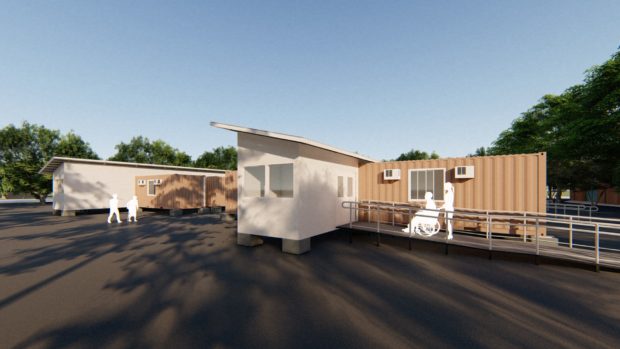It started with an emergency trip to the hospital a couple of days into the Luzon-wide enhanced community quarantine.
“I had to rush my mother to be treated for a brain clot. While waiting outside the hospital premises, I would see patients being turned down by the hospital,” recalled Mac Evangelista, founder of a shipping container modification company.
Evangelista’s mother was then admitted to the hospital but was released after a few days. While monitoring her mother at home, Evangelista noticed the increasing number of stories about people losing their loved ones to COVID-19. News of more hospitals reaching their full capacities, unable to take in patients, also became a cause for concern. As she thought of coming close to losing her own mother, Evangelista said she was able to “relate to each and every story I read.”
Mobilizing the team
It was when Evangelista was doing a 3D model of an affordable condominium development that she thought of mobilizing her team to work on a hospital design that will help address the rising need for healthcare facilities due to the COVID-19 crisis. What surprised Evangelista was that the whole team—which is comprised of Engr. Aly Reyes, Arch. Mark Azuela, Engr. Karry Adawey, Mitch Meñez and Joan Argarin—had expressed willingness to undertake this kind of project.
Following the team’s approval, Evangelista posted on Facebook, calling for other architects—healthcare architects to be specific—who may want to contribute to the project.
“I was surprised to get so much feedback from that post. Healthcare architects whom I have not even met (were) willing to give their services for free,” Evangelista said.
One week after its conceptualization, their team of six grew to 30 volunteers and Rapid Deployment Hospitals (RaD) was born. RaD Hospitals will be built out of decommissioned shipping containers which will serve as intensive care units (ICUs) for critical COVID-19 patients. A total of seven architects worked together on the design, which was made to be easily scalable so that health institutions can address the escalating number of patients.
Each cluster will consist of six 20-ft shipping containers that will be converted into six isolation/ICU rooms. RaD is looking at a 24-hour site operation so that the cluster can be completed in 10 days since time is of the essence in this pandemic. Labor costs for each cluster are estimated to reach P523,000. RaD also made the design possible for disassembly. When the pandemic is over, the units can be dispatched to barangays and be transformed into clinics, operating rooms, delivery rooms and even laboratories.
Other experts on board
Consultants from the Department of Health (DOH) have come on board, as well as a retired DOH Chief of Standards. Doctors who are currently serving as frontliners have also given their inputs, to guide RaD on what the hospitals require.
“We had to follow DOH standards because we will be building negative air pressure isolation/ICU units for severe and critical PUIs and COVID-19 patients,” explained Evangelista.
According to Evangelista, they tried their best to meet all the DOH requirements, but they had to make concessions and make do with the materials that are readily available.
“As much as we want to come up with the ideal design, it’s not an ideal situation where we are now,” she added.
RaD developed site protocols that are different from the usual practice in construction sites as they did not want to add to the worry of the hospitals, Evangelista said.
Pilot facility
The team’s pilot facility will be stationed at the Lung Center of the Philippines. So far, other hospitals including those from North Luzon and Southern Visayas, have reached out to RaD.
According to Evangelista, RaD’s initial plan was to provide ICU rooms in the five referral centers—Lung Center, Philippine General Hospital, Dr. Jose N. Rodriguez Memorial Hospital, St. Luke’s Quezon City and Makati Medical Center. The group was classified so that they can provide for Level 3 and Level 2 hospitals. This means that RaD and the hospital partner will be able to fasttrack construction during the pandemic.
“As one of our volunteers told me, we provide support based on what we can do. And this is that need that no one has been really addressing,” Evangelista shared. “There are those who have been helping in providing masks, face shields, beds, tents. But what happens to those in critical condition?”
Rapid Deployment Hospitals is currently raising funds to build its pilot facility at the Lung Center. It will consist of four clusters which will house 24 negative air pressure isolation rooms/ICUs for severe/critical PUIs and COVID-19 patients. They are calling on private individuals, companies, suppliers and most especially government agencies to extend their assistance so the team can build emergency ICUs at the soonest time possible.
To donate or know more how you can help, please visit their Facebook page, facebook.com/RaDHospitalsPH, or feel free to get in touch with Mac Evangelista at 0918-649-3213 or Mitch Meñez, 0916-745-2225.
